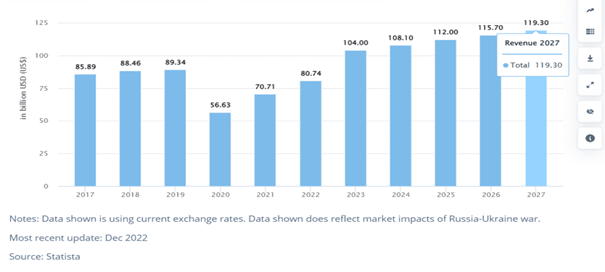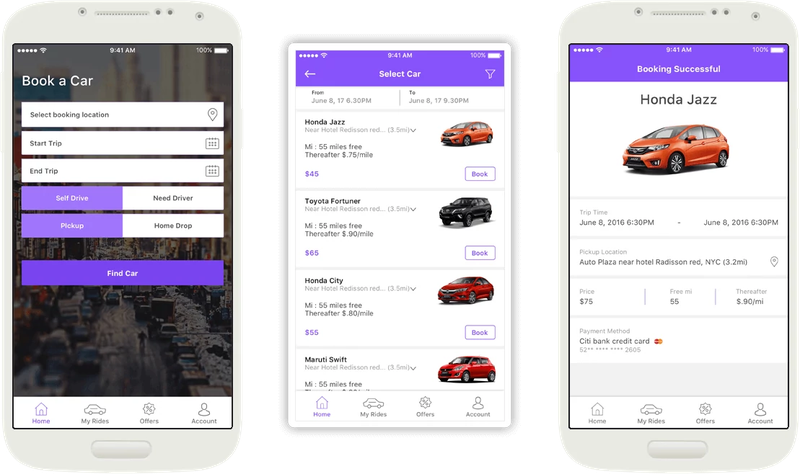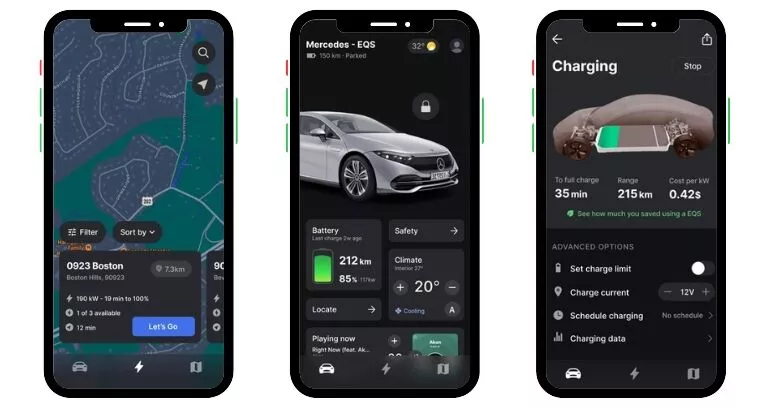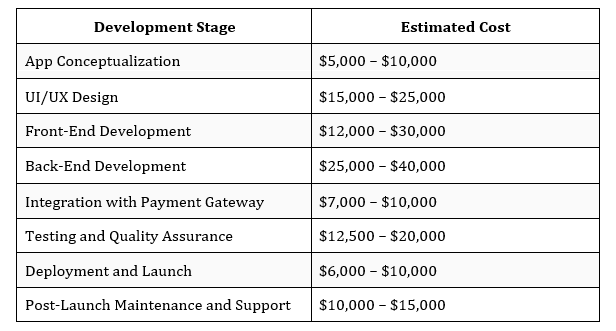Accelerate Electric Vehicle Adoption with EV Rental App Solutions
As more people look for environmentally friendly and environmentally sustainable ways of transportation, electric vehicles (EVs) are growing in popularity. The demand for electric car rental services is developing along with this trend. As a result, a lot of businesses are already creating EV car rental apps that make it simple for consumers to hire electric vehicles for short- or long-term usage. We recognize the value of developing an effective and user-friendly EV rental app that satisfies the requirements of both companies and consumers since we are a top mobile app development firm.

This in-depth tutorial will cover important aspects to think about when choosing an EV rental app, associated fees, and the part mobile app development plays in setting up a profitable electric vehicle rental service.
EV rental App: key insight from Market Research
- In 2022, the size of the worldwide automobile rental market was US$79.2 billion. and is projected to increase by 3.1% CAGR from 2023 to 2028, reaching US$95.7 billion.
- In 2021, the market for electric car rentals was estimated to be worth USD 9.13 billion. By 2027, it is anticipated to increase to USD 20.42 billion at a CAGR of 14.36%.
- Market size is estimated to reach US$119.30 billion by 2027, with revenue expected to grow at a rate of 3.49% per year (CAGR 2023-2027).
- In 2023, it is expected that the Car Rentals industry will generate US$104.00 billion in revenue.

The Benefits of EV Rental App Development

Creating an EV rental app provides a number of benefits for both businesses and clients. For instance, a Deloitte analysis estimates that by 2025, there would be 36.7 million users of electric vehicle car sharing, up from 4.8 million in 2015. Therefore, by using this trend and gaining a larger consumer base, businesses may profit.
Customers may also save money by using a -EV Rental App since they can avoid fees associated with owning and maintaining a personal car, such as insurance, maintenance, and depreciation. According to a Frost & Sullivan analysis, car-sharing apps might eliminate up to 1 billion vehicles from the road by 2025. Thus, there are fewer carbon emissions and fewer traffic jams as a result.
Additionally, an EV rental app provides users with a service that is easier to access and more practical. Renting an electric vehicle becomes a convenient and appealing alternative to standard automobile rental services with an easy-to-use booking and reservation system.
Essential & Innovative Features of EV Rental Apps
EV rental applications must have a number of crucial features and capabilities to guarantee a smooth and effective user experience. From car bookings and navigation to payments and customer service, these components are designed to meet a variety of user demands. Here, we go through the main elements that make electric car rental software successful.

A. User logging in and identification
An EV rental app must have an easy registration procedure so that consumers can rapidly register accounts and utilize the service. Users’ ought should be able to register using their email address, phone number, or social network profiles in most cases. Application security is improved by implementing a secure authentication procedure, such as two-factor authentication (2FA), which helps safeguard user data.
B. System for real-time reservations and availability
Any EV rental app must have a reliable reservation mechanism in place. Users should be able to reserve a car with only a few taps thanks to the app's real-time information about the availability and location of electric vehicles close by. Additionally, users ought to have the ease and flexibility of making bookings in advance.
C. GPS-based tracking and navigation
Users may find the closest available electric car and find their way to their destination by using the EV rental app's GPS integration. Additionally, GPS monitoring aids in the administration and optimization of a fleet by allowing owners to track vehicle whereabouts and usage trends.
D. In-app pricing and payment methods
For a seamless user experience, an in-app payment mechanism must be simple and safe. Several payment methods, including credit cards, digital wallets, and direct bank transfers, should be supported by EV rental apps. Additionally, the app should clearly disclose price structures, such as hourly, daily, or distance-based fees, to enable customers to choose their rental choice in an educated manner.
E. Customer support and feedback
Users get simple access to assistance when needed thanks to a dedicated customer service feature within the app. This feature may contain Frequently Asked Questions (FAQs), troubleshooting manuals, and a way to speak with customer support agents through the phone, email, or in-app chat. By offering a forum for user input, developers are able to constantly enhance the app based on feedback from users.
F. Fleet owners' monitoring and control of their vehicles
Access to vehicle monitoring and management solutions is essential for fleet owners. The software should give fleet owners real-time information on vehicle usage, battery health, and maintenance requirements to help them streamline operations and cut expenses.
G. Finder of Smart Charging Stations
The user experience of the EV rental app may be considerably improved by including a smart charging station locator. The availability and charging speed of local charging stations are displayed using geolocation in this function. Users may more effectively plan their excursions and steer clear of any range anxiety by being given real-time information on charging choices.
H. Estimating Energy Consumption and Eco-Routing
Eco-routing, a sophisticated tool, determines for customers the best energy-efficient route based on variables including distance, traffic, and road conditions. Additionally, the app can predict how much energy will be consumed along the chosen route, assisting users in making choices that will result in a more environmentally friendly driving experience.
I. User Profiles and Preferences That Can Be Customized
Giving customers the option to customize their profiles can greatly improve how they use the app. Users may choose their preferred payment methods, notification settings, and favorite cars, charging stations, and routes. A more individualized user experience that is catered to each person's wants and preferences is made possible through customizable profiles.
J. Gamification and Rewards System
Gamification components and incentive programs can promote user engagement and loyalty. Users can get points, badges, or discounts based on their usage, encouraging eco-friendly driving practices such as frequent charging during off-peak hours and efficient energy use. Along with leaderboards and challenges, this feature may also encourage users to make contributions to a greener and more sustainable transportation ecology.
K. Compatibility with IoT and smart home devices
The Internet of Things (IoT) and smart home systems may be integrated with the EV rental app to provide consumers with new levels of efficiency and convenience. Using their smartphones or voice-activated home assistants, consumers can remotely regulate charging, cabin temperature, and other car settings thanks to this connectivity. By allowing customers to maximize their vehicle utilization, this function not only improves the user experience but also encourages energy economy.
Challenges and Solutions in EV Rental App Development

The process of creating an EV rental app is not without its difficulties. To guarantee that their app is made in a way that satisfies the specific needs of the market for electric vehicle rentals, businesses must carefully plan and pay attention to the nuances. Businesses may face a variety of difficulties as they develop, including the following:
- Compatibility with EV charging networks: Ensuring that the -EV Rental App is compatible with current EV charging networks is one of the main issues. To enable smooth integration, strong cooperation with charging network providers is necessary.
- Battery life and charge times: The restricted range and charging requirements of electric cars might make creating an effective rental service difficult. To avoid inconveniencing or disrupting the client, the -EV Rental App should give correct information on vehicle range and charging times.
- Concerns about security and privacy: It's essential to have a safe and private EV rental app. Strong security measures must be used by businesses to secure consumer data and stop data breaches.
Businesses can implement a number of strategies to address these issues, including:
- To enable smooth integration with the -EV Rental App, extensive collaboration with charging network providers is required.
- To reduce annoyance or disturbance, give consumers comprehensive information regarding vehicle range and charge timeframes.
- including strong security features, such as multi-factor authentication and encryption, to safeguard client data and privacy.
- comprehensive testing and quality assurance checks to guarantee the -EV Rental App functions effectively and dependably.
Tech Stack for Developing an EV Rental App

The project's needs and the app's features determine the technology stack for developing an EV rental app.
Front-end development:
Front-end app development is in charge of the app's user interface and user experience. These are a few examples of the necessary front-end technologies utilized in the creation of EV rental apps.
- Building cross-platform mobile applications: React Native vs. Flutter
- A responsive web interface may be created using HTML, CSS, and JavaScript.
- For state management, use MobX or Redux.
- For making user-friendly interfaces, utilize Material UI, Bootstrap, or other comparable UI frameworks.
Backend Development
The backend development of the apps makes it easy to implement server-side logic, construct APIs, and manage databases. These are only a few of the crucial backend technologies needed to create EV rental apps.
- For server-side programming, choose Ruby on Rails, Node.js, or Django.
- Database management options include PostgreSQL, MySQL, or MongoDB.
- Cloud infrastructure providers include Amazon Web Services (AWS) and Google Cloud Platform (GCP).
Integration with Payment Gateway, GPS & IoT
To make it simple for users to pay for rentals, an EV rental app has to integrate with a payment gateway. Here are some of the technologies that were used in the development of EV rental applications for payment gateway integration:
- Processing payments with Stripe or Braintree
- For payment gateway integration, choose Square or PayPal.
- For in-app purchases, use Google Pay or Apple Pay.
- Location tracking with GPS or BLE beacons
- IoT administration in the cloud with AWS or Azure
Monitoring and analytics
Analytical and monitoring tools are necessary for monitoring the performance of apps and user engagement. The following list includes some of the analytics and monitoring technologies used in the development of EV rental apps:
- In order to analyze apps, use Google Analytics or Firebase Analytics.
- For error tracking and reporting, consider Crashlytics or Sentry.
- For server and application performance tracking, use New Relic or Datadog.
The technological stack of an EV rental app is often flexible and can alter depending on the specific project requirements and the amount of expertise of the development team. But some of the technologies that are most commonly used in the development of EV rental applications are those that were already discussed.
Estimating Cost of Creating an EV rental Mobile App

The price of developing a mobile calendar app might differ depending on a few factors. The complexity of the app, the features you want to include, and whether you design it for iOS, Android, or both. Other elements, such as the app's design and the development team's hourly rate that you employ, can also come into play.
It might cost you $50,000 or more to design an EV rental app. It's vital to keep in mind that costs might vary based on the particular specifications of the project. Speak with a skilled development team to get an accurate estimate of the price of creating an app.

Decodermind Expertise: Why Choose Us?
Decodermind provides a wide range of services, from dynamic mobile app development to personalized corporate solutions and cutting-edge web development. Catering to a diverse clientele across various niches and sizes, we have extended our services to clients in the USA, UK, and Europe.
Decodermind is ready to be your trusted partner on this technological journey, whether you are a startup looking for a disruptive app, an established corporation aiming for digital transformation, or a firm in need of bespoke solutions. Our diverse approach, founded on creativity and technical competence, is adapted to the specific needs of your digital ambitions.
We welcome your ideas, questions, and participation. Your ideas inspire our never-ending quest for innovation. Share your thoughts, inquire about our services, or find us on social media. The future of digital innovation in the United Kingdom is not just a story we tell; it is a narrative we co-create. Join us in shaping the next chapter in the technological growth of the United Kingdom. Explore, interact, and embark on a digital transformation journey with Decodermind
Conclusion
In conclusion, the creation of an EV rental app may benefit both companies and consumers in a number of ways, including enhanced convenience, cost savings, and access to a rapidly expanding market trend of EV usage. Businesses may build an app that meets client expectations and succeeds in the electric car rental industry by incorporating essential elements such as an intuitive user interface, open pricing, and effective reservation management.
However, companies must also prepare for difficulties, such as problems with EV charging networks, the requirement for precise data on vehicle range and charging times, and the deployment of strong security measures to safeguard consumer data.
Businesses require careful planning, coordination, and the execution of solid solutions to establish a successful -EV Rental App that is dependable and effective.
We are dedicated to developing an EV Rental App that satisfies the specific needs of the industry for renting out electric vehicles as a mobile app development firm. Our staff is equipped with the knowledge and know-how to assist companies in developing an app that provides a flawless rental experience while also satisfying the expectations of this developing industry.
In conclusion, companies may establish an effective and competitive -EV Rental App that gives clients a practical and eco-friendly transportation choice. This can be done with the appropriate approach to mobile app development, careful planning, and teamwork.

 Hamid Salman
Hamid Salman